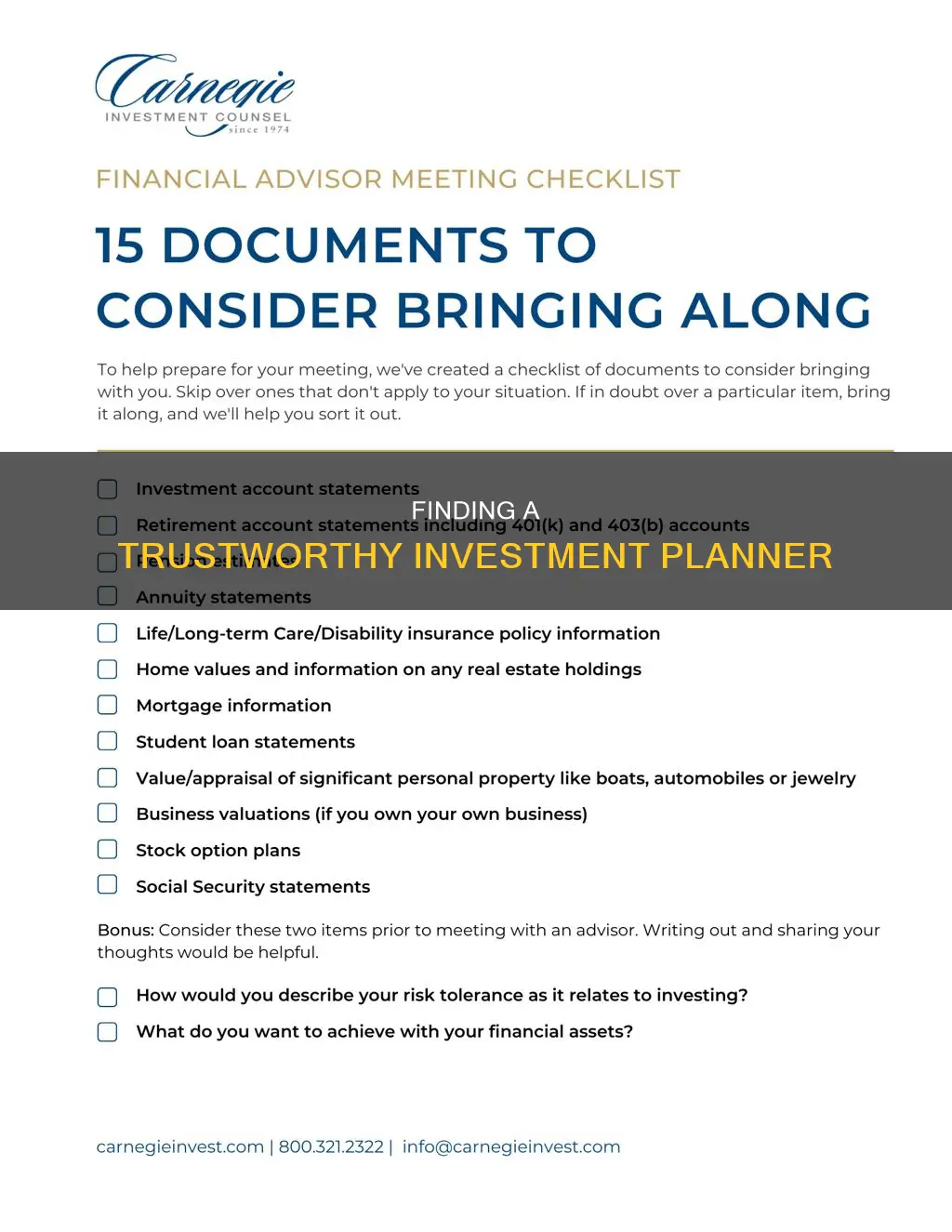
Choosing the right investment planner is a crucial step towards achieving your financial goals. Here are some essential factors to consider when selecting an investment planner:
- Identify your financial needs: Reflect on your financial goals and the specific areas where you need assistance, such as budgeting, tax planning, or investment advice.
- Understand the types of investment planners: Research the different categories of investment planners, including robo-advisors, fee-only advisors, fee-based advisors, and wealth managers. Each type offers distinct services and compensation structures.
- Credentials and experience: Opt for investment planners with relevant credentials, such as Certified Financial Planner (CFP) or Chartered Financial Analyst (CFA), indicating a certain level of expertise and knowledge. Also, consider their experience in working with clients with similar financial goals and situations.
- Fee structure and transparency: Be sure to understand how your investment planner will be compensated and what fees to expect. Look for transparency in their fee structure and ensure they disclose any potential conflicts of interest.
- Investment philosophy and approach: Ensure that the investment planner's philosophy and approach align with your financial goals and risk tolerance. For instance, if you are risk-averse, choose a planner who prioritizes capital preservation over high-risk investments.
- Communication and availability: Select an investment planner who communicates effectively and is readily available to address your questions and concerns through your preferred communication channels.
| Characteristics | Values |
|---|---|
| Credentials and Experience | Certified Financial Planner (CFP), Chartered Financial Analyst (CFA), or other relevant qualifications |
| Fee Structure and Transparency | Commissions, fees, or a combination of both; hourly, flat rate, or percentage of assets under management |
| Investment Philosophy and Approach | Aligns with your financial goals and risk tolerance |
| Communication and Availability | Effective communication through preferred channels, such as email, phone, or in-person meetings |
| Disciplinary History | No formal complaints or legal/disciplinary actions |
What You'll Learn
- Credentials and experience: Look for certified financial planners (CFPs) or chartered financial analysts (CFAs)
- Fee structure: Understand how they're compensated and any potential conflicts of interest
- Investment philosophy: Ensure their approach aligns with your financial goals and risk tolerance
- Communication: Choose a planner who communicates effectively and is available via your preferred channels
- Research: Ask friends and family for recommendations, use advisor matching tools, and check their disciplinary history

Credentials and experience: Look for certified financial planners (CFPs) or chartered financial analysts (CFAs)
When choosing an investment planner, it is important to look for certified financial planners (CFPs) or chartered financial analysts (CFAs) with credentials and experience. These professionals have undergone extensive education, examinations, and ethical assessments to attain their qualifications.
Certified Financial Planners (CFPs) are recognised by the Certified Financial Planner Board of Standards, Inc. CFPs must complete a bachelor's degree or higher, along with specific courses in financial planning. They also need at least three years of full-time professional experience or two years in an apprenticeship role. The CFP exam covers 170 multiple-choice questions across various topics, including professional conduct, financial planning principles, risk management, investments, and tax planning. CFPs are well-versed in financial planning, taxes, insurance, estate planning, and retirement saving. They uphold a fiduciary duty, always acting in their client's best interests.
Chartered Financial Analysts (CFAs) are recognised by the CFA Institute, a global organisation promoting high ethical and professional standards. To become a CFA charterholder, one must pass three rigorous exams, hold a bachelor's degree, and have at least 4,000 hours of relevant professional experience. The CFA exams cover accounting, economics, ethics, money management, and security analysis. CFAs are skilled in investment analysis and occupy roles such as research analysts or portfolio managers.
When selecting an investment planner, it is crucial to verify their credentials and ensure they have the expertise aligned with your financial goals. Both CFPs and CFAs offer distinct advantages, and your choice depends on your specific needs.
Who Manages Their Own Investments?
You may want to see also

Fee structure: Understand how they're compensated and any potential conflicts of interest
When choosing an investment planner, it is important to understand their fee structure, including how they are compensated and any potential conflicts of interest.
Investment planners can be compensated in one of two basic ways: by earning flat fees or by earning commissions. A fee-only planner is compensated directly by the client and does not receive commissions from product sales or financial transactions. This structure offers transparency, with no hidden charges, and eliminates potential conflicts of interest that may arise when a planner's income is dependent on selling financial products. However, fee-only planners may be more expensive and may have a limited scope of products and services offered.
Fee-only planners can charge a flat fee, an hourly rate, or a percentage of the assets under management (typically around 1%). They may also be compensated by a portion of the assets under management, which could create a bias against clients withdrawing funds. To mitigate this, fee-only planners are often bound by fiduciary standards, legally requiring them to act in their client's best interest and disclose any potential conflicts.
In contrast, commission-based planners earn commissions from the sale of financial products or transactions. This structure may provide access to a wider range of services and can be more affordable for clients with smaller portfolios or limited resources. However, there is an inherent conflict of interest as the planner's recommendations may be influenced by their own financial gain rather than the client's best interests.
When evaluating fee structures, it is essential to consider potential conflicts of interest, transparency, cost, and the range of services offered. Understanding how an investment planner is compensated can help you make an informed decision and ensure their recommendations align with your financial goals and interests.
Madoff Victims: A Long List of Investors
You may want to see also

Investment philosophy: Ensure their approach aligns with your financial goals and risk tolerance
Investment philosophy is a set of guiding principles and beliefs that shape an investor's approach to selecting and managing investments. It is important to ensure that the investment planner's approach aligns with your financial goals and risk tolerance.
When determining the right investment planner, it is crucial to consider your financial objectives, such as retirement savings, education funding, or purchasing a home. These goals should be specific, measurable, and realistic, providing a clear path to success. Additionally, understanding your risk tolerance is essential. It refers to your ability to withstand fluctuations in the value of your investments and should be based on factors like your age, financial situation, and investment objectives.
Different investment philosophies cater to varied financial goals and risk tolerances. Here are some common investment philosophies:
- Value investing focuses on purchasing undervalued stocks with the expectation of significant price increases. This strategy targets market inefficiencies and is often associated with legendary investor Benjamin Graham.
- Fundamental analysis involves identifying companies with strong earnings prospects by studying financial statements and economic indicators.
- Growth investing targets shares of newer companies experiencing above-average sales and earnings growth, aiming to benefit from rising stock prices during their expansion phase.
- Socially Responsible Investing (SRI), also known as ESG investing, aligns with investors' values concerning a company's impact on society and the environment.
- Technical analysis involves examining historical market data to identify visual patterns and make buy and sell decisions.
- Contrarian investing goes against the market current, believing that markets are often wrong at extreme highs and lows. Contrarian investors buy when others sell and sell when others buy.
When choosing an investment planner, ensure they have a clear understanding of your financial goals and risk tolerance. Their investment philosophy should align with your objectives and comfort level with risk. This compatibility will ensure that their strategies and decisions are tailored to meet your specific needs and expectations.
Theranos Investors: Medical Backgrounds?
You may want to see also

Communication: Choose a planner who communicates effectively and is available via your preferred channels
Communication is a critical aspect to consider when choosing an investment planner. Effective communication ensures you understand their advice and strategies and feel confident in their expertise.
Firstly, you should choose an investment planner who communicates clearly and effectively. They should be able to explain complex financial concepts in a way that is easy for you to understand. This includes breaking down financial jargon and ensuring you comprehend the risks, potential returns, and implications of different investment options.
Secondly, consider their availability and preferred communication channels. Choose an investment planner who is easily accessible through your preferred methods of communication, such as email, phone, or in-person meetings. This ensures that you can reach them when needed and facilitates regular contact, which is essential for successful long-term financial planning.
Additionally, consider the level of proactiveness in their communication. Select an investment planner who is proactive in providing updates, alerting you to potential risks or opportunities, and offering advice or guidance when necessary. This ensures you stay informed and can make timely decisions.
When deciding on an investment planner, it is beneficial to assess their communication skills and style during the initial consultation. Pay attention to their ability to explain concepts clearly, address your questions and concerns, and adapt their communication approach to match your needs. This will help you determine if they are a good fit for your communication preferences and expectations.
Remember, effective and accessible communication is key to a successful relationship with your investment planner.
MLS: The Next Big Investment Opportunity?
You may want to see also

Research: Ask friends and family for recommendations, use advisor matching tools, and check their disciplinary history
When choosing an investment planner, it's important to do your research. Ask friends and family for recommendations, but be sure to do your own due diligence as well. Scam artists often target groups of people who know each other, so it's crucial to not solely rely on word-of-mouth when making your decision.
One way to find a reputable investment planner is to use advisor matching tools. These tools can help you narrow down your options and find candidates that match your specific needs and requirements. Some popular advisor matching tools include Zoe Financial, Wealthramp, and Harness Wealth. These services are typically free for clients to use.
Additionally, it's important to check the disciplinary history of any investment planner you're considering. You can do this by reviewing their Form ADV, which will provide information on any regulatory, criminal, or disciplinary actions taken against them. This form can be found on the SEC's website or requested directly from an SEC branch. You can also check an advisor's profile on FINRA BrokerCheck for more information on their past.
By conducting thorough research and checking disciplinary histories, you can help ensure that you're choosing an investment planner who is trustworthy and has a clean track record.
Oil Investment Calls: Why Me?
You may want to see also
Frequently asked questions
It depends on your financial situation and goals. Investment planners can help you with a range of services, from money management and budgeting to investment management. If you're unsure, consider whether you need help with budgeting, taxes, or investment advice.
There are three main types of investment planners: robo-advisors, online financial planning services, and traditional financial advisors. Robo-advisors are digital services that provide automated, low-cost investment management. Online financial planning services offer virtual access to human financial advisors. Traditional financial advisors provide in-person meetings and holistic financial planning services.
Investment planners' fees vary depending on the type of service. Robo-advisors typically charge an annual fee as a percentage of your account balance. Online financial planning services may charge a flat subscription fee, a percentage of your assets, or a combination of both. Traditional financial advisors often charge a percentage of the assets they manage for you.
When choosing an investment planner, consider their credentials, experience, and fee structure. Look for designations such as Certified Financial Planner (CFP) or Chartered Financial Analyst (CFA), indicating a certain level of expertise and knowledge. Ensure the planner has experience working with clients with similar financial goals and situations. Also, look for transparency in their fee structure and ensure they disclose any potential conflicts of interest.







